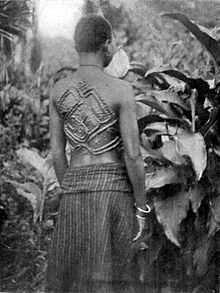Tetela people
 Tetela woman with ritual scarification, c.1905 | |
| Regions with significant populations | |
|---|---|
| Languages | |
| Tetela language |
The Tetela people (or Batetela in the plural) are an ethnic group of the Democratic Republic of the Congo, most of whom speak the Tetela language.
Description
The Batetela live in the region between Lusambo and the Upper Congo River, in the provinces of Sankuru and Maniema.[1] They live by fishing and farming, raising cassava, banana and kola nuts. They are related to the Kusu people, and only became separate in the late 1800s after the arrival of Arabs and Belgians in the region.[2] Both the Batetela and the Kusu are subgroups of the larger Mongo group.[1] The name Motetela comes from a god named Motetela, meaning either "he who laughs not" or "he at whom one may not laugh."[3]
History
According to Emil Torday, who studied the tribes of the Congo between 1908 and 1909,[4] the Batetela originated on the right bank of the Lomami River and migrated to their present territory at some unknown date.[5] In 1869-70, some Tetela groups came into contact with Tippu Tip, an Arab slave trader from Zanzibar.[6] Following this, the chieftain Gongo Lutete began working with Tip and the Arabs to lead the Batetela in slave raids against the Luba people in Kasai.[7] In the Congo Arab war of 1892-1894, the Batetela fought for the Arabs, but later defected to the Belgians.[8] Gongo Lutete was executed by the Belgians in 1893, however, and this caused the Batetela to revolt in 1895 in the first of the Batetela Rebellions. Successive uprisings followed, lasting until 1908.[9]
During the period immediately following independence, Patrice Lumumba, a Tetela, was a prominent politician and the first Prime Minister of the Democratic Republic of the Congo before his assassination in 1961. In 1975, many Batetela were purged from the military.[1]
Notes
- ↑ 1.0 1.1 1.2 Kisangani and Bobb 501
- ↑ James Stuart Olson (1996). The peoples of Africa: an ethnohistorical dictionary. Greenwood Publishing Group. p. 555. ISBN 0-313-27918-7.
- ↑ Torday 372-373
- ↑ Turner 606
- ↑ Torday 372
- ↑ Turner 599; Note that Turner stresses the mutability of ethnic labels in this period, and argues that the term "Tetela" once referred to groups of the Songye people.
- ↑ Turner 587
- ↑ Edgerton 98
- ↑ Renton, Seddon, and Zeilig 34
References
| Wikimedia Commons has media related to Batetela people. |
- Robert Edgerton (18 December 2002). The Troubled Heart of Africa: A History of the Congo. St. Martin's Press. ISBN 978-0-312-30486-7.
- Emizet Francois Kisangani; Scott F. Bobb (1 October 2009). Historical Dictionary of the Democratic Republic of the Congo. Scarecrow Press. ISBN 978-0-8108-6325-5.
- David Renton; David Seddon; Leo Zeilig (1 February 2007). The Congo: Plunder and Resistance. Zed Books. ISBN 978-1-84277-485-4.
- Emil Torday (1921). "Cultural Differences Among the Various Branches of the Batetela". Journal of the Royal Anthropological Institute of Great Britain and Ireland 51: 370–284. doi:10.2307/2843455.
- Thomas Turner (1993). ""Batetela", "Baluba", "Basonge": Ethnogenesis in Zaire". Cahiers d'Études Africaines 33 (132): 587–612. doi:10.3406/cea.1993.1494.